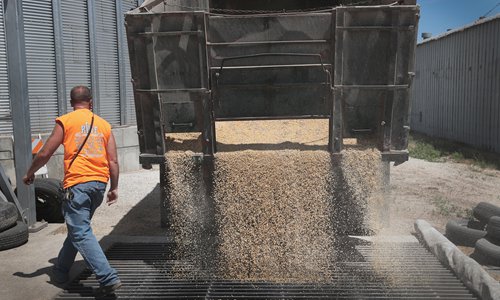US growers long for settlement as trade dispute with China lingers

A man unloads soybeans at a Ruff Bros. Grain elevator on June 13, 2018 in Illinois, the US. Photo: VCG
"A lot less stressful!" said Jamie Beyer, a soybean grower in the Midwest US state of Minnesota, referring to life before the US-initiated trade tensions against China, a feeling widely shared by other US farmers.
"But now you know, every day we're checking the market to see what the prices are doing," Beyer, who is also president of the Minnesota Soybean Growers Association (MSGA), told the Xinhua News Agency.
Praying for solution
Soybean prices have been hit hard since last year, as collateral damage of the US administration's tariffs against China, which makes it more difficult for farmers to stay in business as their paychecks are mainly dependent on the market, according to the industry leader, who joined the MSGA in 2015.
For many US farmers, starting an agricultural operation requires a huge investment, including purchasing equipment, which can cost tens of thousands of dollars. More importantly, it is often a long-term decision for families.
However, since 2018, the US administration has imposed several rounds of additional tariffs on Chinese imports.
In retaliation, China levied tariffs on a list of items imported from the US, including some agricultural products like soybeans.
As the world's largest consumer of soybeans, China was the destination for about 60 percent of US soybean exports before the trade dispute.
In 2018, that number dropped to 17.9 percent.
To weather the damage, the chief of the soybean association and her counterparts across the nation have made unprecedented efforts to diversify their export markets over the past year.
Beyer said that resolving the trade dispute with China tops her wish list this year, as US farmers want to "have a satisfied customer," which "happened to be China for many years."
Speaking of Washington's aid program to offset the ongoing tariff damage to producers, Beyer said "the aid is acknowledgement that specifically our industry has been targeted and hurt through the negotiation," but "we would rather have trade."
Kevin Paap, president of the Minnesota Farm Bureau and fourth-generation owner of his family farm that primarily produces soybeans and corn, said the US and China should negotiate to figure things out.
"If we can work together to come up (with) some agreement that benefits both sides of that agreement, it's very important to agriculture," said Paap, adding that US farmers want trade rather than aid.
The American Soybean Association, which represents more than 300,000 soybean farmers, issued a statement in May, opposing using unilateral tariffs to address the US trade imbalance with China and other countries.
Bleak business outlook
The US administration's trade rifts with China have hurt farmers in various agricultural sectors.
US pork farmers are increasingly worried that their longtime efforts to secure a foothold in China are evaporating.
The protracted trade tensions may dampen the outlook for their access to China, the world's biggest pork market, and consequently cripple the entire industry.
"Without a doubt, we would love to have access to the Chinese market... There's a tremendous demand in China, and we can certainly fill some of that demand," David Preisler, chief executive officer of the Minnesota Pork Producers Association, told Xinhua.
More than 25 percent of the country's total pork production is exported, with China being a major buyer, according to data from the US Meat Export Federation.
According to US authorities, American hog farmers are estimated to be losing out on $1 billion annually amid the trade tensions with China.
David Herring, president of the National Pork Producers Council, told a US House Agriculture subcommittee in a hearing last month that retaliatory tariffs imposed by China and other countries are "one of the most damaging threats" to his industry.
Hope for collaboration
US beef producers, who are looking forward to gaining a larger share in China, also long for a settlement of the trade rifts between the world's top two economies, which potentially cloud the outlook for business collaboration.
China is a relatively new market for US beef, but with a lot of potential to tap, Ashley Kohls, executive director of the Minnesota State Cattlemen's Association, an organization that currently represents more than 1,000 members from all segments of the beef community, told Xinhua.
US beef producers have been excited to enter the Chinese market after years of absence as a result of the detection of the mad cow disease in the US, she said, adding that her association has sent a working group to Asia every year since 2017 to promote sales.
US anti-tariff advocacy group Tariffs Hurt the Heartland warned that as the country's trade disputes with its trading partners persist, repercussions will be felt by farmers, factory workers and everyday consumers nationwide.
Xinhua
Newspaper headline: Fallout for the farmers